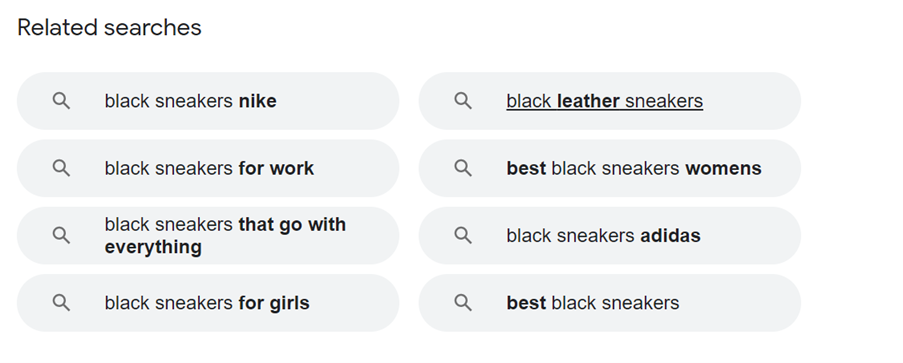SEO is essential for every business, but for eCommerce, it’s especially important. An online store has a lot of complicating factors that aren’t an issue for regular businesses like contractors. And with the COVID-19 crisis leading to a boom in ecommerce, competition is currently fiercer than ever.
Choose your keywords wisely
In contrast to a local contractor, eCommerce sites are often competing for keywords against huge, multi-national retailers. Choosing the right keywords can make all the difference.
Unless you’re selling something super-unique, the chances are that there’s some stiff competition for the most obvious keywords.
Spend some time researching and look for long-tail keywords. Try searching high-competition keywords and then look for alternatives using the suggested searches at the bottom of the page. For example, searching for ‘black sneakers’ suggested these additional keywords:
Put some effort into your product listings
It’s fairly common for eCommerce stores to simply dump the manufacturer’s description on the product page and leave it there. Unfortunately, this means that you are going to have the exact same content as potentially hundreds of other websites.
The second issue with this is that it’s not uncommon for manufacturer descriptions to be very bland or even contain spelling errors. Information that might be important for making a purchasing decision might be missing.
Getting creative with the product description means that you can make the content unique while still keeping in all of the relevant factual details about the product. You can also work in your long-tail keywords to improve the page’s ability to rank.
Optimize your metadata
Metadata provides information to help search engines understand what kind of content a page contains. Title tags and meta descriptions are the two areas of focus to optimize your metadata for SEO. Making the best possible use of title tags and meta descriptions helps to ensure a better click-through rate as searchers can easily see that your content matches their search intent. Keep your title tags to 70 characters or under to ensure they display properly.
Don’t forget to add category descriptions
Category descriptions are a great way to get more keywords onto your page and give you a competitive edge. If you have a lot of text, you can maximize the keyword without keyword stuffing, and that text can be placed below the list of products on the page – so that it boosts your SEO without forcing customers to scroll through a wall of text to find the products.
Get an SSL certificate
Every website that collects customer information should have an SSL certificate, but it’s absolutely crucial for an eCommerce site. Most hosting providers insist that eCommerce sites have an SSL certificate, and almost every eCommerce platform includes SSL. If, for some reason, you don’t have one – make this a top priority!
At Leadspruce, we understand the specialized needs of eCommerce SEO. Our tools allow us to pick up on and implement things that you or your development team might otherwise overlook – like product paging. We can help you find and identify any issues and put fixes in place to solve them – helping you rank as highly as possible for those valuable keywords.


